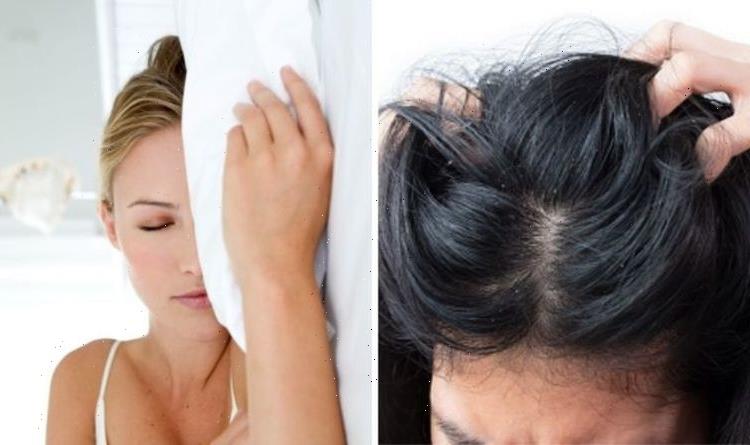Doctor reacts to 'scalp popping' TikTok trend
We use your sign-up to provide content in ways you’ve consented to and to improve our understanding of you. This may include adverts from us and 3rd parties based on our understanding. You can unsubscribe at any time. More info
One in two people in the world have had dandruff at some point in their life, but we don’t have to put up with flaky scalps. We all have Malassezia globosa, a fungus on our scalps that survives on the oils we produce. However, some people are sensitive to the oleic acid produced by this fungus and that’s what causes dandruff. Other things can make it worse though, from hormonal changes and stress to styling products and changing weather. But did you know that poor sleep can play a role in your scalp health? Express.co.uk chatted to top trichologists for Nizoral, Stephanie Sey, to find out about the link between dandruff and sleep.
Sleep is important for all aspects of health, even scalp health.
Trichologist Stephanie said: “The body does all its repair work when you are sleeping, that is why it’s so important to ensure you are getting a good night’s sleep.
“Sleep helps reset the body, repair cells and tissue and do that ‘essential maintenance’ the body needs.”
Lack of sleep increases your stress levels, exacerbating existing dandruff.
The expert added: “Higher stress levels can cause and increase levels of cortisol, and this leads to the scalp producing more oil.
“These oils interact with the fungus Malassezia which can result in dandruff.”


All adults should be getting seven to nine hours of sleep every night for health and beauty reasons.
Stephanie explained: “Many of us underestimate the value of a good night’s sleep, but when it comes to your beauty routine, sleep is key.
“Your body recovers and repairs itself whilst you snooze, but sleep can sometimes take a backseat with many of us leading such hectic lives.”
The trichologist has revealed six ways to make sure you get enough sleep and take care of your scalp while you sleep.

Pillow sprays
If you’re struggling to wind down in the evenings, why not try a pillow spray?
Stephanie said: “Pillow sprays are blended with essential oils such as Lavender that are proven to produce sleep-inducing hormones – their aromas cause our bodies to produce melatonin, a hormone which promotes restful sleep.
“The regular use of pillow mists over time can train the mind to become associated with a specific scent when falling asleep, to help you doze off quicker.”
Silk pillowcases
Cotton pillowcases are known to absorb the oils from your hair, which can lead to your locks becoming dry, brittle and prone to breakage.
Instead, Stephanie recommended treating yourself to a satin or silk pillowcase to avoid causing damage to your strands and scalp as you snooze.
She said: “Silk and satin pillowcases keep your hair frizz-free and silky smooth.”
Anti-dandruff shampoo
Don’t just use any old shampoo, make sure you’re using a shampoo that will tackle your concerns.
Stephanie said: “If you find that you are experiencing a dry, itchy scalp, try incorporating an anti-dandruff shampoo.
“Work a product such as Nizoral into your sleep routine to alleviate symptoms.
“Nizoral anti-dandruff shampoo is clinically proven and gives long-lasting relief from dandruff.
“Compared to most anti-dandruff shampoos that only act on the surface, Nizoral treats the root cause of dandruff itself, not just the symptoms.”
Silk scrunchies
If you sleep with your hair up, invest in some silk scrunchies.
“Silk is the best material for your hair accessories – its natural, smooth texture has been found to improve the quality of hair.
“Tie your hair up in a bun or a loose plait to decrease the chances of hair damage during the night.”


Scalp massagers
Not only does a scalp massage help you unwind before bed, but it also contributes to good scalp health.
Stephanie said: “The bristles increase the blood flow and stimulate the hair follicles to encourage hair growth.”
Get a cheap manual massager online or seek out an expensive, electric device for your scalp.
Brush and detangle
Always brush and detangle your strands before you sleep.
Stephanie said: “Brushing your hair before bed will help distribute natural oils through your locks whilst you sleep for extra conditioning.
“Take a detangling brush before your head hits the pillow to gently tease out any pesky knots without snagging or tugging.”
Source: Read Full Article
